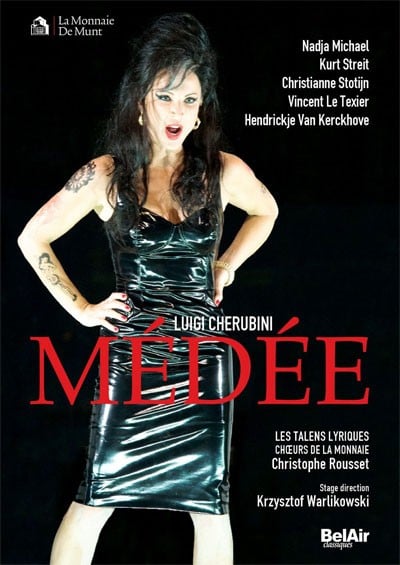OPERA SEARCH

Médée
(Medea) (1793-97)Libretto by François-Benoît Hoffman (F)
2S,M,T,BBar; small roles:2S,1spoken role; silent roles; mixed chorus;
2(I=picc).2.2.2-4.0.1(+1 opt trb).0-timp-strings; wind instruments from orchestra and thunder machine off-stage
Abbreviations (PDF)
Anton J. Benjamin / Simrock
Théâtre Feydeau, Paris
Company: Julie-Angélique Scio (Médée) / Pierre Gaveaux (Jason)
| MEDEA | Soprano |
| JASON | Tenor |
| CREON, king of Corinth | Bass-Baritone |
| DIRCE, Creon's daughter | Soprano (Coloratura Soprano) |
| NERIS, Scythian slave | Mezzo-soprano |
| Confidants of Dircé | 2 Sopranos |
| Head of the guards | spoken role |
| The two sons of Jason and Medea | silent roles |
| Maidens of Dircé, Argonauts, Guards of Creon, People of Corinth, Priests |
Corinth, in Creon's palace
Once upon a time, the Thessalian prince Jason and his soldiers conquered Colchis. Médée, the king’s daughter, who possesses magical powers, fell in love with Jason, notwithstanding his treason against her country and family. She bore him two sons and helped him to seize the Golden Fleece. In Corinth, where Jason has sought refuge, he presents his war loot. The Fleece – a symbol of power – is to become Corinthian property. In exchange for the Fleece, King Créon offers Jason his daughter Dircé’s hand in marriage. Full of misgivings, Dircé fears that Jason might abandon her in the future, as he abandoned Médée. Her fears seem justified when Médée suddenly bursts in on the wedding preparations, but she fails in her attempt to reclaim her former rights and win back Jason. Créon banishes her from the city for the crimes that she committed in the past. Feigning humility, she is granted a day’s grace and is allowed to see her children once more. While the wedding ceremony of Jason and Dircé proceeds, Médée plans her terrible revenge. Shortly afterwards, Dircé dies as a result of the poison-soaked festive dress that her rival sends her. Haunted by conflicting emotions, Médée first asks the slave Néris to bring her two sons to safety, but eventually decides to commit a terrible deed – killing her own children. Jason’s marriage is in tatters and Médée withdraws from the scene.
The commanding role of Medea provokes both sympathy and dismay; Cherubini’s music draws us into her inner struggle, the dramatic shift from love to devastating hatred. Rather than focussing on the plot itself, however, the opera explores the psychological processes experienced by the characters. With its stylistic diversity, its dark grandeur and sublimity as well as its grand, self-contained musical scenes, Médée points far beyond the operas of Cherubini’s contemporaries. Hence the acclaim for the work expressed by Haydn, Beethoven, Mendelssohn, Schumann, Wagner and Brahms does not come as a surprise; indeed, Brahms went so far as to praise Médée as the “highest dramatic art”.
“Cullmann’s rightly award-winning version removes all these alterations. Now, a sharp, budding piece of music theatre emerges to excite the audience, for which the generic concept opéra-comique is intended – as much for Médée as for Carmen. However, above all, in the Callas recordings of Medea the classical performance style seems bloodless and empty. In Brussels, with Christoph Rousset and his orchestra Les Talents Lyriques, experts in historical performance present the Cullman version for the first time, and already by the F minor overture, this results in a storm of passion breaking the bounds and rules of convention.” Süddeutsche Zeitung
Tragic

Michael, Streit, Stotijn, Le Texier, Van Kerckhove / Les Talens Lyriques & Chœurs de la Monnaie / Christophe Rousset (Brussels 2011, directed by Krzysztof Warlikowski)
Bel Air Classiques DVD & Blue-Ray
